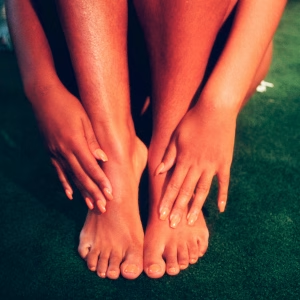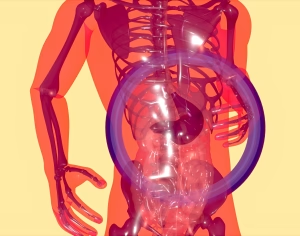Acupuncture
What do Gout, Varicose Veins, & Neuropathy Have in Common?

What do neuropathy, gout, and varicose veins have in common? In western medicine not much, aside from being awful inconveniences, ranging from sources of extreme pain to discomfort and/or a significant cosmetic preoccupation.
For neuropathy you go to the neurologist, for gout to the rheumatologist, and for varicose veins you might see your primary care, who will likely refer you to a vein specialist. The neurologist may or may not inquire about venous circulation, and it is very unlikely the rheumatologist will ask about numbness or tingling in your feet.
But from a Chinese medical perspective, all of these conditions fall under the heading of impaired circulation in the lower extremities, caused by either weakness, inflammation, or both, leading to a misdistribution of bodily fluids, which exacerbates the former, which exacerbates the latter, and so on.
They are different in specifics only as a result of individual genetic proclivities—in fundamental mechanism they are the same. Someone with a colder bodily constitution—prone more to hypothyroid or hypotension, will be more susceptible to varicosities, whereas people with warmer body types—prone more to hyperthyroid or hypertension, will be more susceptible to gouty arthritis. The former are well advised to eat plenty of lamb and red meat, while the latter might consider being mostly vegetarian.
Neuropathies can go either way in the way of temperature, as they are more telling of issues with fluid metabolism. We find that neuropathy patients are either unusually thirsty, unusually not thirsty, or they urinate excessively or not enough. In either case, their body is clearly weakened to some degree, and it is imperative they get to sleep by 11pm, so nerves can properly regenerate.
While inadequate urination obviously leads to fluid retention which can clog neurological pathways and impair circulation, excessive urination can dry vessels of their healthy synovial fluids, causing us to feel parts of our body we previously took for granted as being unaware of.
Holistic medicine should modulate the organ function that is causing the improper excretion of fluids in addition to treating local blockages causing pain or discomfort. Easier said than done of course, as such conditions generally took many years to form, plus might be aggravated by present challenges, such as diet, stress, or medications being used to treat other conditions. However, through a course of treatment of acupuncture, herbal medicines, and dietary modifications, one should see improvement over a proper course of treatment, 120 days.
Please be discerning in your choice of clinician. If you see someone—whether east or west—who is failing to assess or treat beyond the immediate site of pain or discomfort, I would highly recommend getting a second opinion.
NEW Jersey Office!

Not to worry! I have no plans, nor ideations of leaving my New York office, as I’m not sure there’s enough acupuncture in the world to heal me of the inevitable heartbreak of severing all ties with the greatest place on Earth. But I have decided to finally be a reasonable human being and upstanding member of MY Jersey community and start accepting patients there.
In fact, this was partially motivated by reminiscence my brother and I often share over how neither of our parents were ever particularly connected or plugged into the community in which we grew up, in Tappan, New York. Mom was a part of the PTA up to a certain point and Dad came to all my games, but the rest of their respective lives were elsewhere—Dad’s in Manhattan, Mom’s in New Jersey, and when their empty nest began, we think its enjoyment may have suffered as a result. I digress.
Happy to announce that I am now renting space part-time at Studio 509, a lovely space very close to home—almost walkable—in Maplewood, NJ! Schedule by appointment.
In the meantime, my schedule in New York remains unchanged, Mondays and Fridays from 10-7, Wednesdays from 10-4. Please do not hesitate to reach out to schedule, nor to ridicule me for partially selling out for the garden state.
Acupuncture for Stomach Pain

We have all experienced stomach pain. Either we ate something wrong, a medication we took had side effects, it might related to one’s menstrual cycle, and/or be simply chronic digestive issues that have some genetic component. How do we treat this with acupuncture and Chinese medicine?
First, per usual, we must identify the correct pattern.
If someone suffers from chronic constipation and bloating, we can assume the pattern is one of “food stagnation,” which can be corroborated by a dense sensation in the middle finger position of the right radial artery—also by palpating the epigastric region for tenderness. These patients tend to feel overheated, they might experience excessive thirst, insomnia, or irritability, all as a result of the intestinal inflammation. Whether or not there is distention alters the diagnosis.
We can needle points along the stomach and large intestine vessels to move gases out and downward. Depending on the rest of the pattern, we might also use the pancreas or even lung vessels to transfer mitochondria to the former organ vessels, the way one might money from their savings to their checking account, as needed. Herbal formulas indicated tend to revolve around rhubarb root, possibly lily-turf, gypsum stone, or white peony, the latter of which can be especially adept at treating all forms of cramping in the body.
From a western medical perspective, these are patients who might benefit from intermittent fasting and/or a magnesium supplement.
More commonly, stomach pain has to do with our blood. Either it is not moving or not arriving to the local area, leaving the smooth muscles of the organs dehydrated, sent into spasm in search of fluids, but we experience it as, Ouch. My tummy hurts.
In a pattern of “blood stagnation,” acupuncture works exceptionally well. We can use points along the pancreatic or liver vessels to encourage healthy blood movement. We might also use local points around the abdomen—where everyone always wants us to put it—to encourage local vasodilation and the dissolution of amenable masses. Useful herbal families might revolve again around white peony or rhubarb, but also apricot kernel, corydalis, or safflower. Generally, the veins beneath the patient’s tongue will be distended and purple enough to corroborate diagnosis.
Lastly, is blood deficiency, which might be slightly less amenable to acupuncture—more so to moxibustion, herbal medicine, the consumption of red meat, and healthy sleep hygiene. Moxibustion is often more effective at generating mitochondria and healthy fluids than acupuncture. Herbs we might consider are rehmannia, angelica, or even red dates, the latter of which has the added benefit to settle heart palpitations and anxiety.
Since 2 of the 3 physiological patterns for stomach pain pertain to the blood, it is quite common to be menstrual and/or hormonal related. Some patients for whom it is impractical to come every single week can benefit from coming at least just twice a month, the week before and after their cycle begins.
Spring Wind!

Did anyone else notice how many times in the past week the weather said something like 52 but felt more like 32? Spring wind! In the lunar calendar we are already well into spring, the season the ancient Chinese correlated with pathologies of “wind.” What does that mean?
“Wind pathologies,” in Classical Chinese, basically refers to anything that moves within the body. Think joint pains or almost any pains, also neurological tics, from Restless Leg to Parkinson’s disease, finally many dermatological conditions that traverse different body parts and seem to constantly change in shape or surface area covered. Where does it come from?
The pathology of autumn is dryness, hence all the foliage drying up and sinus issues it commonly brings. Following is the bitter cold of winter, which consolidates said climate of dryness, constricts our blood vessels, thereby offering fewer pathways for lubrication, whether to our skin, orifices, or otherwise.
Dryness, in Chinese medicine, whether manifesting as a lack of blood, lack of healthy blood, mucosal metabolic fluids, or parasympathetic neurotransmitters, can give rise to physiological symptoms that might be metaphorically described as “wind.”
Another cause can be literal wind, as it gusts down the avenues and seemingly even turns corners to blow hats off our heads and make 52 degrees feel like 32. This causes a local constrictive response in the head, which contains our autonomic nervous system, which manages a great part of vital organ function. Am I suggesting the entire body is connected and that which accosts the head can in turn accost our entire physiology? Yes. Ask anyone who’s suffered a concussion. What can we do?
Wear a scarf. Wear a hat or a hood. Wear a hood over your hat. Wear a mask beneath the hat beneath the hood above your scarf. You don’t have to be sick or paranoid to wear a mask in the cold and/or windy months of the northeast. You can simply be protecting your many cranial nerves that traverse the face and have far-reaching physiological implications. Modern fashion is such that there are many stylish options for these accessories. With all we have already working against us—modern stress, western diet, the simple biology of aging—doesn’t it make sense to do the simple, little things to prevent or prolong the scale from tipping into Parkinson’s?
As for “wind prevention” by way of treating the root, which is to say nourishing blood and vital fluids, I have mostly the same old boring, science-based advice: Animal protein, eggs, cooked vegetables, small portions of rice or pasta, meditation, and going to sleep before 11pm. As for accessible, food-grade Chinese medicine, tea made from red dates, licorice, and/or pearl barley can also be helpful. For the spring we also recommend more sour foods, kraut, lemon, and/or vinegar with the intention of “astringing” as many of our good fluids as possible.
Lastly, happy Mercury Retrograde, an admittedly somewhat ironic salutation to those who “observe.” Remember to expect delays in transit and traffic and problems in technology and communication. Double check who you’re sending that text or email to. Accept that things will go wrong. Try to breathe. Ask people to clarify before shouting back at them. Breathe again.
(photo from a fun shoot back in 2007, one year pre-Chinese medical school!)
The 4 Seasons of Each Day
 While many people are preoccupied with what foods are good for them, what foods are “bad,” and which exercise is ideal, from a Chinese medical perspective it is easier to simplify: The more we live according to the Dao (the scientific way of nature), the less ailments we will have. The less we live with the Dao, the more ailments we will have.
While many people are preoccupied with what foods are good for them, what foods are “bad,” and which exercise is ideal, from a Chinese medical perspective it is easier to simplify: The more we live according to the Dao (the scientific way of nature), the less ailments we will have. The less we live with the Dao, the more ailments we will have.
One Daoist, and subsequently Chinese medical principle is that each individual day contains within it the same seasonal arc that we experience in each year. Obviously, this does not mean that every day in January and February around 12 noon the temperature visits 80 degrees (though wouldn’t that be nice? But confusing). The arc is relative.
The morning hours correspond with the mechanisms and principles of spring. Rise and shine. “Plant seeds” for the day, in the form of a healthy breakfast and possibly setting one’s intentions. If you truly don’t have time for a good breakfast during the week, try to have an earlier lunch and be sure to do so on weekends. Morning is a good time for exercise, but not as ideal as mid-day, nicknamed “Tai Yang,” most yang and/or high noon.
Mid-day corresponds with summer. It is when most people have the most energy, hence it is the time to be most physically active. Since Chinese medicine views most parts of the body from a “use it or lose it” perspective, the less disciplined we are about engaging in at least some movement during the Tai Yang hours (11am-3pm), the weaker we will become. Again, if this is challenging during the work week, I recommend finding and committing to 15-minute windows, then “realer” workouts on weekends.
Sunset to nighttime obviously equates with autumn and winter, hence regenerating and restoring, winding down until sleep. This parallel is the one with an apparent hole in logic, as we recommend eating more calories in the winter than summer, but more during the day than at night when the body is relatively more insulin resistant. My understanding is the premise is more applicable to activity than caloric consumption, and principles of relativity still apply. Eat smaller meals for dinner in summer than in winter and remain restful at this time during all seasons. If you enjoy going out and indulging with friends once or twice a week or once or twice a month, by all means do so, but follow a more Daoist schedule on all other days.
In my opinion, there is actually virtue to a lot of “gimmick diets,” abstinences, and new age health regiments. However, in thousands of years, neither the human body nor nature has changed very much. If it had our medicine would be rendered wholly ineffective. Follow the Dao.
Go to sleep at a healthy bedtime, eat a healthy breakfast, exercise at mid-day.
Eat cooler foods and less foods in summer—warmer and more foods in winter.
Minimize indulgences, stress, and reductionist medicines.

